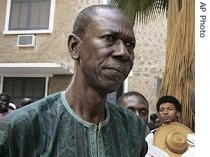2006年VOA标准英语-Activists Wait for Justice in War Crimes Case o(在线收听)
By Phuong Tran
Dakar
20 November 2006
Prosecutors who want Chad's exiled former ruler, Hissène Habré, to face charges of crimes against humanity say they are facing obstacles despite a pledge by the Senegalese government to organize a fair trial.
-----
 Abdourahmane Gueye, left, seen at court in Dakar, Nov. 25, 2005 |
||
"Have you tasted a traditional Senegalese rice dish before," Mr. Gueye asks, explaining that the family will now eat together. They gather around a large silver bowl filled with yasa, the Wolof name for a thick tomato curry rice dish cooked with caramelized onions.
After lunch, Gueye and his younger brother watch news coverage of France's upcoming presidential elections.
But in the evening, his meeting with a group of international human rights lawyers reveals a more complicated agenda.
In his own words, Gueye's goal is to see former Chad leader Hissène Habré brought to justice. He says that from morning to night, this is his mission. He is anxious to hold Habré accountable for his own six-month imprisonment in the "Piscine," a swimming pool converted to a notorious detention center in Chad's capitol, N'Djamena.
He says he had done nothing wrong. He says he was arrested after trying to enter Chad with jewels he was intending to sell to the French military.
Mr. Habré ruled Chad from 1982 to 1990, when the current president of Chad, Idriss Déby, overthrew him, forcing him to flee to neighboring Senegal. Since his overthrow, Mr. Habré has been indicted of crimes against humanity by courts in several countries, but never brought to trial. His accusers say that he is responsible for more than 40,000 deaths, and thousands more disappearances.
When efforts to bring him to trial in Senegal stalled in 2000, the prosecution tried to introduce the case in Belgian courts, due to the nationality of some of the alleged victims. Belgium issued an international arrest warrant for Mr. Habre in 2005. In response, the African Union issued a mandate to keep the case in Africa and to try Mr. Habré in Senegal, where he has political asylum.
The Senegalese government announced earlier this month that it will seek funds and international support to convene a commission to prepare the trial.
This announcement has been met with both relief and skepticism by members of the prosecution team, including Secretary General of RADDHO, a Senegalese human rights organization, Alioune Tine.
"What we hope for is concrete action and not only an announcement," he said. "We are waiting for the real commitment, real actions, very urgent actions."
The Chadian Association for the Promotion and Defense of Human Rights is the organization that reached out to international and regional human rights groups to help it file the original criminal complaint in Senegal in 2000. Its president, lawyer Jacqueline Moude?na, is also impatient for the case to move forward.
"The case has been held up long enough," she says. "As Habré's accusers die, or become ill it is becoming even more urgent for the Senegalese government to act on its responsibility to try the case quickly."
Also waiting for his day in court is Mr. Habré, who has been living in exile for 16 years since his overthrow in 1990. He lives with his family in the suburbs of Dakar. Speaking on his behalf is one of his three defense lawyers, Mr. Mamadou Lo.
"Mr. Habré's lawyer says that the crimes for which his client is accused are still happening in Chad, a country that remains in conflict," he says. "Mr. Habré cannot be held personally responsible for crimes against humanity when the crimes were begotten by war, in a country where, Lo says, the citizens continue to suffer repression."
He also says that his client, Mr. Habré cannot be held responsible for the actions of those who worked for him.
An inquiry by Amnesty International, a London-based human rights organization, reported that leaders of the security forces during Mr. Habré's regime, including current President Idriss Déby, were themselves accused of carrying out torture, and that the culture of impunity continues in Chad.
The prosecution says that several conditions will need to be in place for the Hissène Habré case to move forward. First, Senegal's domestic law concerning torture must be changed to be in line with the U.N. Convention Against Torture, which Senegal has ratified. A draft of the law is currently awaiting passage in Senegal's parliament.
Second, Senegal will need funds and support to be able to organize and carry out the trial in Dakar. Senegal will need to convene the commission, which will need to determine how to organize a fair trial.
Finally, they say, there must be the political will to move this case forward, which skeptics feel may be in short supply from the Senegalese government during an election period.
Meanwhile, Gueye, the Senegalese who was once jailed in Chad, waits to see Mr. Habré in court.
For Gueye, justice would be for Mr. Habré to present himself in a court of law before the victims and their families. Gueye says that if the accusations are false, then Mr. Habré will win. If the accusations are proven true, he says, then he and the families who have waited years for this case to come to trial will be the winners.